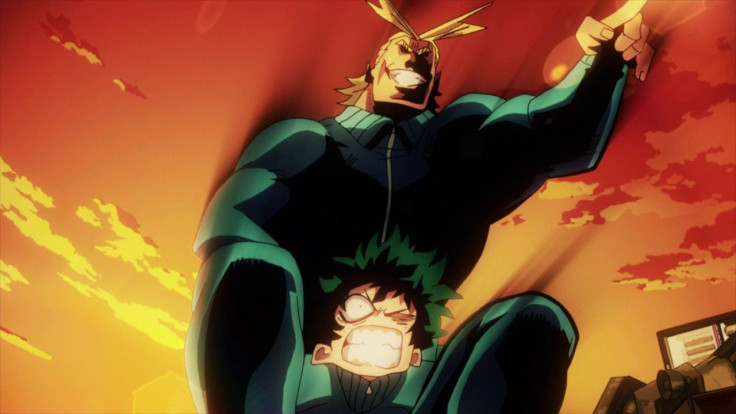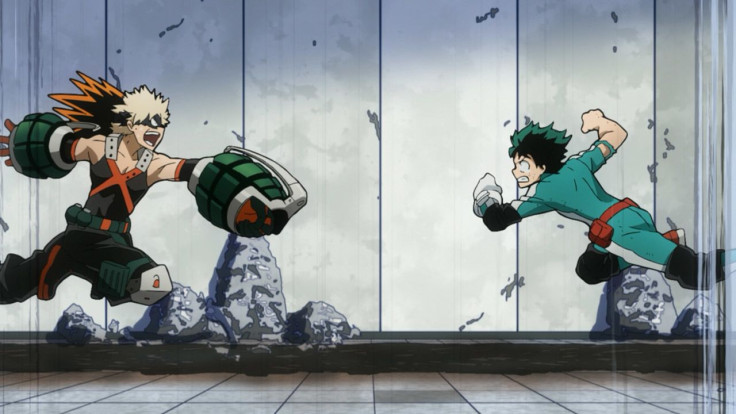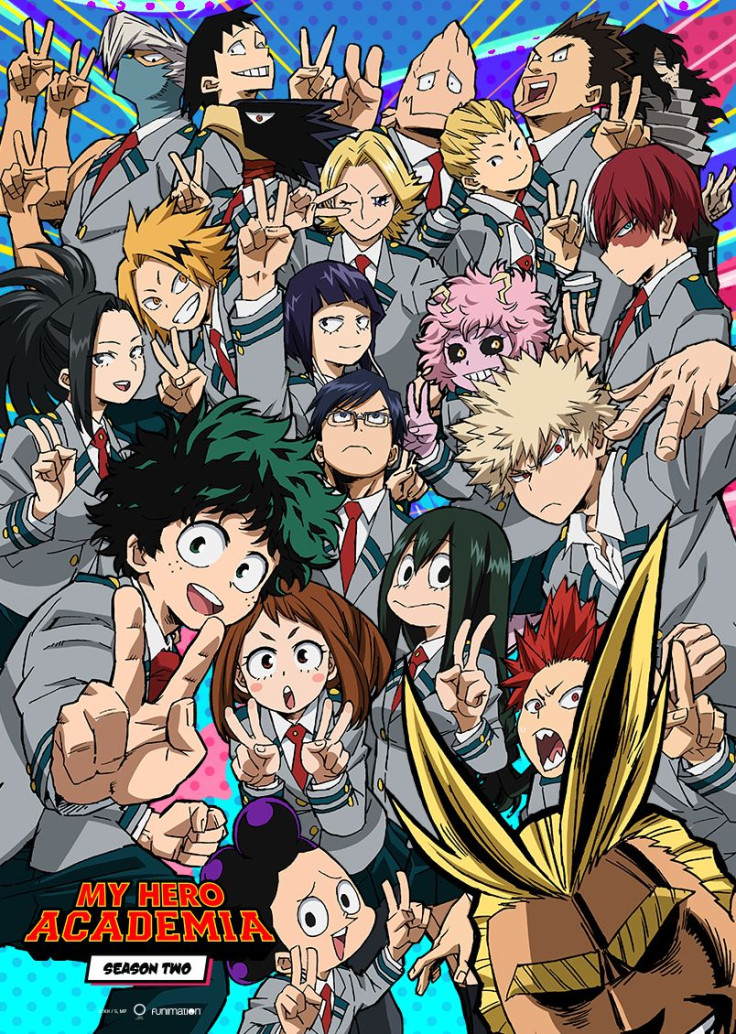My Hero Academia has begun to draw comparisons to other popular Shonen series like One Piece, Naruto and Bleach.
Whether it’s the deep characters or unique story, many manga and anime fans have gravitated towards this relatively new series. There’s no denying that My Hero Academia is one of the best produced shows in anime, thanks to Studio Bones’ animation and FUNimation’s dubbing.
The production and animation is one of the series’ greatest strengths and Player.One sat down with Chris Sabat (voice of All Might) and Justin Briner (voice of Deku) to talk about the anime’s growing popularity, its production and how it stacks up to other Shonen anime.
NOTE: This interview has been lightly edited for clarity and length.
Player.One: My Hero Academia has become so popular so fast. As actors who have worked on popular anime before, how is this show different?
Justin Briner: The source material -- and the manga artist -- was so inspired by superhero culture and Western culture that a lot of that has been infused in the anime style and tropes that you are sort of used to, but they are subverted in these nice and meaningful ways that I think audiences of all kinds can appreciate.
Chris Sabat: It’s a very fascinating marriage between a great story and, probably for one of the first times, a great animation in a Shonen. You rarely see a series that you know is going to have 150-plus episodes take that much time with the episodes. Not only are they taking a Western sentimentality to the anime and manga style, they’re actually taking a Western style when it comes to production schedule. They’re doing 13 super tight episodes, and then taking a break and making sure the next batch of episodes are polished instead of just, what’s usually, an assembly line-type fashion for the Shonen style anime. It’s just gorgeous, we played at our panel yesterday, the scene where [looks at Briner] you’re facing off against, ummm...
JB: Todoroki in the tournament.
CS: I mean, I’m flabbergasted whenever I see that scene where [Todoroki’s] hands glow and the spikes of stone and fire meet one another and then the blocks that fly off. You don’t see that in your average anime very often. Each season looks like a season that would be coveted if there was only one. That one series that you would pass around and say “have you seen the animation in this?” I think, as a guy who’s been working on Dragon Ball for so long, I tell people at pop culture conventions about the show because I think it has the same spirit that a show like Dragon Ball or One Piece. It’s just so bound for greatness that I want people to be on the ground level like we are.
Any other projects you’ve both worked on that can compare to the unique animation and production of My Hero Academia?
CS: There are other shows that are just beautiful. Tsubasa Chronicles was a gorgeous show, Fullmetal Alchemist was a great show. Even Panty and Stocking, in a bizarre way, was a really neat show. I know [Briner] worked on a ton. There are a lot of shows that have really beautiful moments but nothing, so far, that’s been so perfectly done as My Hero Academia, just yet.
JB: Yea, I’ve done a bunch of beautiful properties but nothing as ambitious as My Hero. Saying “we’re going to start our best quality here, and we’re going to keep it at the very top for the next 100 episodes.”
CS: By the way, any time we mention episode numbers -- I know I did and he just did. We don’t have a clue how many episodes there are going to be at this point.
JB: [Laughs]
CS: We have no information as to how far or how many seasons it’s going to go, but I know it’s been wildly successful and I doubt they’re going to stop any time soon.
Do you feel My Hero Academia has the staying power as other shonen anime, like One Piece and Naruto?
CS: I certainly do.
JB: I do too. I mean, I hope so. I think that it started so strong and it’s already amassed a vibrant, energetic community around it. I would love to see it go far.
CS: It’s hard to compare it to something like One Piece, because One Piece has its own specific charm to it. I really feel the goal -- I imagine, I’m not in the production meetings -- their M.O. is quality over quantity or else they would have done 26-episode seasons and there would be less quality in animation. I’m still interested in it; we’re in the middle of Season 2 and it’s so engaging. So far it feels like watching Breaking Bad, where you’re watching Season 1 and second season built on that and the third season built on that. It seems to me that they are taking that same method and pushing themselves to make every season awesome. If that continues, I don’t see how people won’t gravitate towards the show.

Your two characters have a lot of screentime together, do you two get to record together?
JB: Unfortunately, for all dubbing of any kind, you only record alone. It’s just you in the booth, the director and the engineer are making things happen. You know, they’re doing the magic. If you’re lucky enough you are doing it late in production where you get, at least, the English recordings to record off of, but otherwise it’s sort of in the director’s hands to make sure things stay cohesive and fluid. You may say a line that’s perfectly good acting, but you gotta say it a little quieter because it doesn’t match how this conversation volume is in my mind.
CS: There’s really, as a director too, it’s just a necessity you have to record separately. Americans don’t tolerate bad dubbing as much as other cultures do. In Japan, I’ll say half of their content is dubbed. Even their own anime is dubbed, because of the nature of the way they dub. Yes, they record altogether but they don’t really focus as much on the mouth movements as we do. So to get that right, you really have to have one actor in there and you’re not only drilling what the right acting is for that scene, but you’re also having to go, ‘Ok, there’s a space after that second word. Let’s speed up the last half of that last sentence. Guess we’ll have to rewrite that first sentence so it fits better.’ There’s an entirely different challenge to it and if you have more than one person in the room at a time, it gets too confusing and you’re waiting on somebody... I can only imagine if you’re dubbing in a group there’s always a person who isn’t doing their best work because he’s feeling paranoid that he can’t get that one line right and everyone else is nailing theirs or vice-versa. So it’s good for the ego to sort of do it alone. It can be a bit of a solitary process, but once you’ve done it long enough, there’s actually benefits to dubbing than those who work in pre-lay don’t get. Pre-lay actors don’t know what the episode is going to look like or how the characters doing. Any of the times I’ve done pre-lay for video games and things like that, there are times when I see it at the end and go “man, if I knew it was going to be like that, I would have done this for that.” But we’re lucky that we get to see the character’s intimate facial features and movements, especially on a show like this that’s so beautiful, we get so much more to work with. But the sound, the animation sometimes you have to imagine being able to put the final piece of the puzzle to this gorgeous anime and you get to hear it in your headphones, you get to hear the sound effects in your ear. I think it really helps the performance.

Do you try to add your own “flair” when recording your characters?
JB: Certainly. I think if my only goal was to set out and exactly match the Japanese actor that it would fall a little flat, on my end. He’s wonderful, but he’s not me. I take what I feel was very successful from his performance to internalize that and make it real as well.
CS: I do have to commend [Justin] though. It’s one of those things where you can switch back and forth between the Japanese and English and it feels similar. We’re really lucky that they are taking as much care with the acting with the Japanese version and they all know that it’s a really broad show so they paint with broad strokes. So that allows us to do really big, giant comedic things and also be really serious when it needs to happen. Following what our Japanese colleagues do is very helpful to us, but the lines don’t translate exactly word for word, so there are moments where I may be saying a similar line, but his face doesn’t look like he’s supposed to be saying that. So you have to try and find a way to say the line in a way that matches what his face looks like.
Do you record All Might and No Might in separate sessions?
CS: Oh no, they’re in the same session. It’s a fun challenge, we actually just recorded an episode where No Might gets angry while he’s reading the line, and it’s weird because on the page it said half the line and then dot dot dot the rest of the line. And typically as a dub actor we hate when you have to break up the line like “I think I have to go…….to the store.” And it’s so annoying when it’s broken up that way, but as we previewed it we realized that he’s so angry that he transforms from No Might to All Might in a single line and that’s such a fun challenge to do both.
Was there a moment while recording, specifically, that you needed that push from direction to get a line or moment right?
JB: Sure, actually, there’s a time. I think it was the Deku vs Todoroki fight in the tournament where I knew going in that this was an important fight. So, I started too strong. Where my energy was in the beginning of the fight would leave me with nowhere else to go at the end. So I would be just one note the entire time. That wouldn’t do justice to the scene, so our director Colleen, consciously reigned me back in she was like, “No, no start here. You got the right energy, you got the right idea. You still want to be very awesome and cool but we got to work there. We have to make you get there for a reason.”
CS: I’m having trouble finding a specific scene. But all the lines are really good collaboration between ourselves and Colleen. Colleen Clinkenbeard deserves so much credit for why this dub sounds so good. She is one of the best dub directors, but because she’s an executive at FUNimation. They have her doing so many other things, she doesn’t always get to step in the booth. But man, they decided to load up their secret weapon to direct this show. And she’s insisting on it even though it makes her life infinitely more difficult. With her it’s the perfect thing that happens with a director, where you both feel like you’re moving and have that same momentum, and the director is getting as excited as you do...I feel in there we both are kind of moving towards the best that we can possibly do. That’s the best way and most fun way to record.
What do you want to tell the My Hero Academia fans to get them excited for future seasons?
JB: The fans have been wonderful. It’s been so nice to be able to engage with them and be a part of something that I can tell they love as much as I do. So thanks for sticking around, if it keeps going at this pace it’s only going to get better from here. Get in while you can, tell your friends, it’s really so wonderful.
CS: There’s nothing I can tell the fans that will make them better fans, because if you’re already a fan of the show you’re locked in for life. And I don’t want to get too political on this, but I would suggest, I would beg fans to curb their curiosity for what’s happening and really try to support the official release. There are a lot of animators that work extremely hard on this show to make it successful, and I can tell you that it’s not an inexpensive endeavor for FUNimation to have a show like this and to produce it the way they do. Actually purchasing the episodes, legally streaming helps the industry and will continue to make these shows possible. Because once people start to get everything for free, and I understand man if you don’t have a single dollar and you really want to watch this show I totally get it man. I remember when MP3s were first available and I had no money and I could literally download anything, I get it. But If you can, please try to support the official release; it helps all of us.















![[EG April 19] Best 'Stardew Valley' Mods That Will Change](https://d.player.one/en/full/226012/eg-april-19-best-stardew-valley-mods-that-will-change.png?w=380&h=275&f=955520b8313253ee3c39c791f6210f38)



